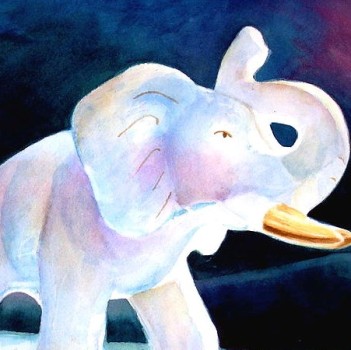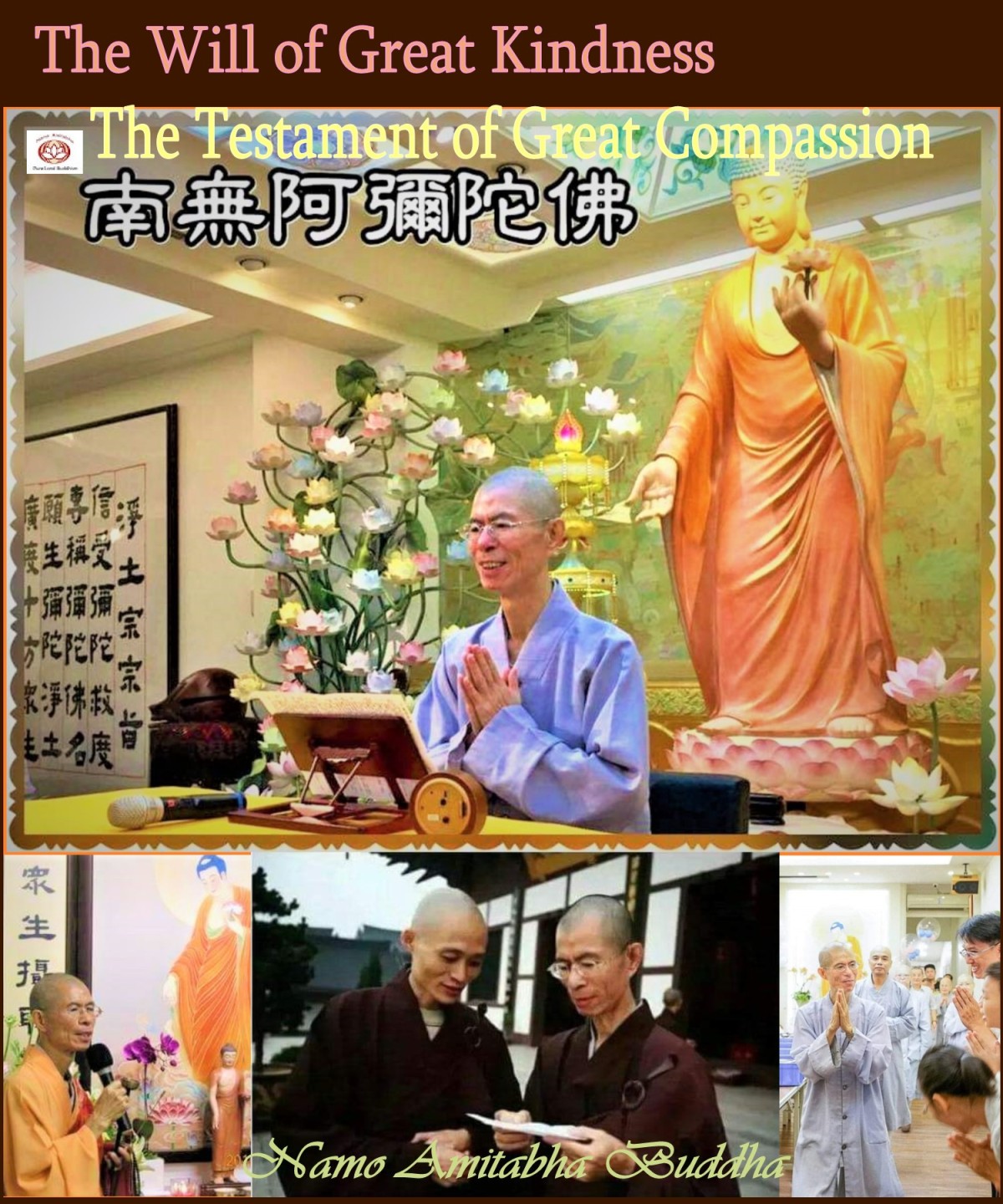慧净法师遗嘱
The Testament of Dharma Master Shi Hui Jing
Time flies. Days and months fly by swiftly. Suddenly, I am already sixty-five years old, entering the age of old folks as declared by the government. Life is impermanent. Some young men have already left the world, what is more so for an old man? So, at the end of this year, I have decided to declare my will first. I hope all the old folks should have a will beforehand.
1
If I were to fall ill suddenly, such as down with a stroke, myocardial infarction (heart attack), infected with acute illnesses, falling unconscious, weak in breathing and such like, please do not send me to the doctor. Do not try to rescue me using any methods. At that moment, I only wish to wait silently to attain a rebirth.
2
After I have passed away, do not wash my body, do not change my clothes. Do not conduct any ceremonies to put me into the coffin, to seal up the coffin. Please send for cremation as fast as possible. Do not look for sharira. The bones and ashes should be grinded into powder and spread them to places with affinity.
3
Do not spread the obituary of funeral. Do not conduct any ceremony to say good bye. Do not build a grave. Do not send the remains into a pagoda. Do not erect any plate of remembrance. Do not erect any image. Do not put up a plate for prayers. Do not conduct any seven days prayers. Do not conduct any prayers of remembrance annually. It is unnecessary to conduct any anniversary ceremony of remembrance. The Buddha has thus said, ‘I am one of the Sangha.’ In the Sangha, everyone should abide by the teachings on Six Harmonies. No one has any special rights.
4
Abiding by the Buddha’s rules, all the belongings of the Sangha belong to the Permanent Dwelling. I do not possess any gold, silver or precious things. I only have Sutras and clothes. They come from the Permanent Dwelling and they will be returned to the Permanent Dwelling. Any extra cash will go back to the fund of the Permanent Dwelling.
5
Any property (immovable real estates) of the Permanent Dwelling which are registered under my name will be returned to the Permanent Dwelling and managed by them.
6
The Governing Board of the Chinese Pure Land Buddhist Association will elect the Abbot and the manager of the Household affairs of the Sangha to conduct the monastery work, the Dharma work. Besides, Dharma Master Shi Jing Zong is assigned as the Permanent Guider in Dharma. The Sangha in Taiwan and the Sangha in the mainland led by Dharma Master Shi Jing Zong are of the same religion association. The Sangha from the two places should abide by the teaching of Dharma Master Shi Jing Zong. He is the Dharma instructor for the Sangha.
7
Chinese Pure Land Buddhist Association is the highest association of the Taiwan Religious Order which takes control over all the Way Places and Sub- branches.
8
The director of the Association should fulfil these five conditions:1. He is loyal to the Religious Order 2. He has profundities in the Dharma meanings and understood the meanings thoroughly. 3 He is replete with the characteristics of a Sangha 4. He is highly qualified. 5. He is very experienced.
9
The council members of the Sangha work to head the various temples in the many places should be elected from the council members or directors of the Chinese Pure Land Buddhist Association, so that the Sangha will be strong and complete.
10
The Pure Land cultural and educational Foundation, the Lights of Patriarchs Educational foundation belong to the Chinese Pure Land Buddhist Association. The directors and supervisors are also chosen from the council members of the Chinese Pure Land Buddhist Association.
11
All the deacons of the Religious Order should be elected from the volunteers of Amitabha Buddha. They must possess the strong missionary feeling to spread the teaching on Amitabha Buddha’s Rescue widely. They should memorise all the Dharma words for the volunteers and keep them in mind, practise them wherever they go.
12
The Dharma Door of Amitabha Buddha has its foundation based on a loving mind. All the deacons should conduct the service based on the love for all living beings, not based on the requirement of management. They should treat every one who stays in the Permanent Dwelling like a precious gem, bestowing upon them loving kindness, gratitude, understanding, warmth and care, without considering if they are the Sangha, the mundane men, old or young, worthies or deluded, newcomers or old dwellers as they are all the members of the Religious Order. They should develop a mind to contain others’ dirt and filth. They only talk about the good deeds and hide away any unwholesomeness. With a profound mind of great virtues, all living beings and things can be cared for, without differentiation. When the mind is broad, it is able to take in all walks of life. We should treat others in the way we treat ourselves. Or we should treat them like our parents, our children. We should relieve them of sufferings and afflictions, so that they will dwell in serenity bliss. By doing so, they will lead a life of calmness, directing their mind towards the love for the Dharma, the love for the work.
In the Sutra, it is thus said, ‘Treating all living beings like oneself.’ It is also said, ‘Reflecting on one’s fault, we will cover others’ sins expediently. We love to cultivate a mind of kindness. We do not mind working for living beings, giving our service to them. We only wish that they will dwell in calmness, joy and bliss. Even if we were to undergo sufferings on their behalf, we will have no regrets.’
It is as stated in the ‘Great Learning’: ‘It resembles the pure mind of a child. When we seek sincerely, though we have not reached the target, we are not far from it. You cannot find a girl who learns to take care of a baby before her marriage.’
Mencius has thus said, ‘Every man possesses the mind of forbearance in confronting others. When the past Kings are replete with a mind of forbearance, he would be able to govern with forbearance. With a mind of forbearance to run the country, it will be a smooth run for the government.’
As it is said, ‘Learning from the Buddha the mind of Great Compassion means that I will learn to love others in the same way as Amitabha Buddha has loved me.’
13
The permanent dwellers in a Religious Order should not fight because of different views in property, finance, name, position and power. They are expected to develop compassion, wisdom and respect for one another so that the propagation of Amitabha Buddha’s Rescue can be carried out smoothly. I only hope that every one of the permanent dwellers to live in harmony, abiding by the Six Harmonies and Respect. Everyone should realize in themselves the compassion and wisdom of Amitabha Buddha, to live in harmony, love and respect, to contain and understand the faults of others.
We should treat each other with gratitude, kindness and understanding. We should learn to be humble, soft hearted and at peace. We should always appreciate the goodness of others, to lower ourselves before others. We should share out all the animosity and blames.
Do not be emotional, do not harbour anger and get angry, do not criticize others, do not scold others, do not complain about others as our priority is set on the peaceful running of the Religious Order. We will live in harmony and give our cooperation with loyalty and faith, with the same mind and the same virtues. We cultivate the same practice and propagate the same Dharma Door of Amitabha Buddha’s Rescue.
14
The ancients have thus said, ‘A man who upholds the heavy responsibilities, who treads the long journey, does not choose a particular place to stay.’ I only hope that all the worthy ones will take good care of themselves.
15
I will end this Testament with these verses: If you are thinking of me, please recite Namo Amitabha Buddha. I am staying inside the six syllables, Namo Amitabha. Having faith in this Dharma by ourselves, we will be able to teach others to have faith in the Dharma. It is a difficult job as many difficulties come forth. But with a mind of Great Compassion, the Dharma can be spread pervasively to transform all living beings. This is indeed repaying the Kindness of the Buddha.
With Respect from Hui Jing
31st December, 2015
光阴似箭,日月如梭,瞬息之间,我已年满六十五岁,已迈入政府界定之老人年龄。人生无常,青壮之人尚有不测,何况老人,故于岁末年终之际,预立遗嘱。亦望老人们,预立遗嘱。
一、假若我突然身有不测,如中风、心肌梗塞,或病危、神识昏迷、气息将断等,皆不送医、不做任何急救措施,唯愿当下静待往生。
二、往生之后,不用净身、更衣、入殓、封棺,亦不做任何仪式。请尽速火化,不捡坚固子。骨灰磨粉洒葬,分别洒向有缘之地。
三、不发讣闻、不做告别式、不筑墓、不晋塔、不立碑、不竖像、不放牌位、不做七、不岁祀、亦不做任何年度纪念。佛说“我在僧中”。为僧应遵六和之佛训,不应有特权。
四、遵照佛制,僧人遗产,归于常住。我无收藏金银宝物,唯有经书、衣物,乃来自常住,今仍归于常住;若有余款,亦皆归于常住。
五、我名下有常住登记之不动产,自应交还常住管理。
六、由“中华净土宗协会”之理事会选出教团之住持、当家,领导教团推展寺务法务,并以净宗法师为永久导师。台湾教团与大陆净宗法师所开展之教团,乃联体机构,两地教团皆以净宗法师为导师,皆由净宗法师指导。
七 、“中华净土宗协会”为台湾教团之最高机构,统辖各道场及分支机构。
八、协会之理事需具备五个条件:一、对教团忠贞不离,二、对法义正确深入,三、具僧品,四、具资历,五、具干练。
九、教团之各地寺院,其僧务委员应从“中华净土宗协会”之理事人员选出,以确保教团之巩固性、完整性。
十、净土宗文教基金会及祖光教育基金会,皆属“中华净土宗协会”所辖,其董监事亦应由“中华净土宗协会”之理事担任之。
十一、教团执事皆为弥陀志工中之志工,要有强烈的使命感,为弘扬弥陀救度承担继往开来的使命。于《志工背诵法语》应熟背,并念兹在兹,时时实践之,处处落实之。
十二、弥陀法门,爱心为本。执事们以爱心服务为原则,不以管理要求为原则。于常住众,不论僧俗老幼贤愚久近,皆教团之人,皆须珍惜之,慈爱之,恩待之,体贴之,温恤之,照顾之。
含污纳垢,隐恶扬善,厚德载物,雅量容人。视人如己,或如自己父母儿女。排除其苦恼,使其得安乐,令其安心、安住、乐法、乐业。
如《经》言:“于诸众生,视若自己。”又言:“自省己过,善覆他罪,乐修慈心。愿为众生趋走给使,令彼安稳欢娱受乐,为他受苦心不生悔。”
亦如《大学》说:“如保赤子。心诚求之,虽不中,不远矣。未有学养子而后嫁者也。”
亦如孟子说:“人皆有不忍人之心。先王有不忍人之心,斯有不忍人之政矣。以不忍人之心,行不忍人之政,治天下可运之掌上。”
所谓:“学佛大悲心,弥陀如何爱我,我便如何爱人”。
十三、教团之常住众,没有产业财务及名位权力之意见可争,但有悲智和敬及弥陀救度之弘扬可期。务望全体常住众,依六和敬共住共处,共体弥陀悲智,互相和睦爱敬、包容接纳;
彼此恩慈体贴、谦卑柔和;凡事让美归功、分怨共过。
不情绪、不脾气、不生气,不批评、不责备、不抱怨。以教团大局为重,团结一致,必忠必信,同心同德,共修共弘弥陀救度法门。
十四、古人说:“任重道远者,不择地而息。”诚望诸贤,善自珍重。
十五、末后说偈:若想念我时,请念弥陀佛,我也居住在,六字名号中。自信教人信,难中转更难;大悲传普化,真成报佛恩。
慧净 敬白
二零一五年十二月三十一日


